Leagioan News Agencies
-

Mouri-Kudo Against Elthize & Leagio Unification in Response Elthizic Supreme Court Ruling
In Elthize, the recent news about the case of Gresham v. Elthize in the Elthizic Supreme Court had been a wake call for Leagioan voters as the ruling in the Commonwealth's neighbor travel in that the political party known as The Unitees in Ethlize was declared to be a legal political party that should not be suppressed by the Elthize government. The reason for the suppression was the fact that the party, The Unitees, support the idea that Leagio and Elthizic should be united as one nation. In Elthize, the idea of merging is not strongly supported and in the Commonwealth, the same opinion can be said the same thing. In recent polling done weeks previously, only 4 % of Leagioans support the idea of admitting Elthize into the Commonwealth, while 38% are against it and the rest are not sure on their own stance to the matter. Few political parties actually take an active stance in support of the idea and some have stuck to it, especially after the release of the ruling of Gresham v. Elthize. The only party in support of the idea has been the far-right National Patriot Party, while the United Peoples Front and Social-Progressives (President Mouri-Kudo alliance) have strong come out against the idea. President Mouri-Kudo when asked on her opinion on the ruling, she stated this to the press:
"While it is indeed surprising on the specializations of the ruling within Elthize. However, this ruling does not change my stance on the matter that I am against and will never willingly support the idea of Leagio and Elthize merging into one nation or admitting Elthize as a state into the Commonwealth. Elthize has had its independence and sovereignty for many years, which I think should continue. Furthermore, the idea of it would be unconstitutional to the EU Constitution that the Commonwealth ratified as we joined the European Union a couple of years ago. Any party in Leagio that either supports the merging or defends the idea is willing to test the limits of democracy in exchange for the creation of tyranny on a people, which is against the principles of founding President Hudson when he wrote the first constitution of the Commonwealth."
-

Lahaye Cabinet Tackles Teacher Shortage in Leagio
Education in Leagio has been constantly shifting as days went by through many administrations. The Lifejumper Administration instituted more forms of testing like LEYE (Leagioan End of Year Exam) on various subjects such as math, science, and Leagioan History. The Ariza Administration before hand instituted stronger requirements on certification on teachers like taking the National Teacher Ethics Test and Strategy Implementation Test. The Sardou Administration back in 2007 implemented the adoption of the Specialized Education Fairness Act in order to provide better resources to students with disabilities within the classroom. However, the one thing that all of these government administrations failed to focus on was the number of teachers that needed to be hired after each move that they made. Many of these measures required teachers to have more duties to their jobs but did not receive in their eyes good job compensation or pay. The average pay for teachers in Leagio is about 35,400 Sulias or around 54,000 Euros but many teachers have issued complaints that the pay is too low when considering that the school requires them to purchase materials for the students in order to continue employment.
In response to these complaints, the Lehaye Government submitted a bill to the House of Councilors called the Teacher Appreciation and Reform Act immediately into its intiation as a parliamentary government. The Act changed the following:
-
Required that Leagioan School Districts and Systems (both public as well as private that receive any Federal grants) to redistribute the workload on teachers among all staff equally or create new positions for a positive educational environment for all persons in the school system.
-
Creates a national pension system that shall be combined with any state or territorial pension system
-
Creates an Evaluation system for teachers that shall not focus on the LEYE standardized test scores that schools receive
-
Protects any Teacher unions that are formed within school districts and systems
-
Requires that states and territories raise the minimum salary wages of teachers that are new to be 40,000 Sulias, while current teachers receive 45,000 sulias. These new wages will start next school year to allow for districts and systems to begin budgeting.
-
If a teacher's students receive a high average on the LEYE on their tested subject, then they will receive a larger increase on their tax returns.
-
Provides districts and systems with grants for funding, if they are able to show high retention of teacher staff members.
The Act passed the National Congress with strong support with 338 Councilors of 541 in favor and 62 Senators supporting the motion, which was signed by President Mouri-Kudo recently into law. The Civil Populists were strongly divided on the issue as many are from states and constituencies that have high teacher shortages. Although the act does not fix the issue of teachers buying supplies, the act is expected to convince teachers to stay in the classroom and actually feel recognized by the government of the Commonwealth for all of the hard work that they have to do each school day in order to build-up a future for their students.
-
-

Major Alliances Announce PM Candidates and Begins Campaigning
Starting this week, the hardcore campaigning for the National Congress begins as the month of December recently started meaning that the election for the National Congress is up for voting in December 20 this year. In this race, the entire House of Councilors with 533 seats will be up with half of the 123 Senate seats. At the same time, all of the legislature branches of the states of the Commonwealth will be up for election. In the old constitution, the entire National Congress would be up but under the revised 2022 edition, the method had changed where the House will be up for another 2 years and after 2024 will be up at most every 4 years unless when dissolved. The system for the Commonwealth has especially been changed as the House of Councilors has more power as the house needed for a government to be formed and a Prime Minister to be selected.
The main alliances have announced that they plan to hopefully have a majority within the House of Councilors for their own governments, but polls at the moment show that there are only three realistic possibilities that will be coming in December 20th. By now all the alliances have released their platforms for potential voters to read and see, while the campaigning throughout the Commonwealth is being done.In addition, all the alliances hav announced their candidates for a potential Prime Minister of Leagio:

Prime Minister Lahaye during a session of questioning held in the House of Councilors
For the Social-Progressive, Councilor of the Progressive Alliance Party and current Prime Minister Marie Lahaye announced that she was selected to be their candidate with the support of the Social Democratic Party. Prime Minister Lahaye has already positive polling in how she has runned her government in a coalition with the United Peoples Front. She created Project Wayside which was to provide another Deepwater port and harbor on the Commonwealth, which at the moment has turned out to be very successful and coming along well with said project nearly completion in the housing and residential and the harbor is already started with it expected to completed by March next year.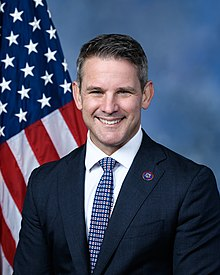
Protriat of Alfred Stone during his time as Loors Minister of Development
Hope for Leagio, which comprises of the Free Democratic Party and the Eastern Leagio party, announced that their candidate for Prime Minister will be Alfred Stone, who was Minister of Development for the now State of Loors under a Civil Populists and Progressive Alliance Coalition government about 15 years ago.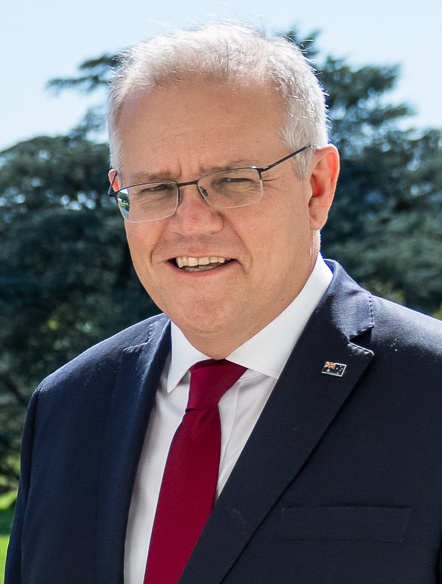

Senator Russel at the top and Councilor Phila at the bottom
The Future Republican Alliance, which compromises of the Civil Populist Party, Conservative Reform Party, and Christian Democratic-Republicans, announced that they will have two candidates as a possible Prime Minister. The Party with the most that the Candidate representatives will be Prime Minister and the other will be Deputy Prime Minister. The Civil Populists announced that they candidate will be Councilor Liz Phila, while the Conservative Reform party announced that they choose Senator Sam Russel to be their candidate.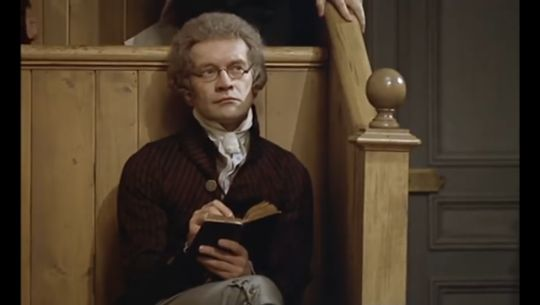
Councilor Wilhelm Duran sitting down during a debate about the energy crisis
The United Peoples Front alliance had made the decision long before the other alliances in where they selected Councilor and leader of the alliance in the House of Councilors Wilhelm Duran as their candidate. Councilor Duran of Socialist Union Party is a popular candidate for the left wing base of the alliance and voters, where he had been a stronger advocate for daring measures to fight climate change.Recent polling shows that the Leagioan Voter base, in the lower voting age bracket especially, have started to shift from the more conventionally elected parties like the Civil Populists and Conservative Reformists like seen back in 2020 but in higher numbers. As polls have shown that voters might be considering on voting Parties in either the Social-Progressives or United Peoples Front. Although, much deadlock had occurred in the first two years of the Mouri-Kudo administration, President Ran Mouri-Kudo is still a popular president among the young voters but a lot of voters in terms of voting for Congress have shown thought that there needs to be more reform through a socialist practice that had been seen through the coalition government that Lahaye had first formed with the United Peoples Front alliance that included the Socialist Union Party. The question on which of the two alliances will have a majority in the House of Councilors at least is still up in the air for debate as some pundits speculate that there is the possibility that there will be hung House in terms of alliances.
The main issues that have been at the top of many voters according to polling recent is in the top three, which is constant job opportunities available, Health Care Reform, EU Stability, and Energy. Voters list these as the their top issues that many of the alliances and parties have worked to focus on this election season. The Mouri-Kudo Administration with the Lahaye Government had worked tirelessly on these main issues, but voters still feel that more can be done on these problems.
These are the pltform ideas that all the alliances have been campaigning on so far to voters:Social-Progressives
- Stronger investment in public infrastructure and energy, particularly wind and solar.
- Leagioan membership into the Treaty of Telum by 2024
- Creation of a Independent Anti-Corruption Agency
- Establish a more consistent VAT to fund various economic programs
- Institute a nationalized mail system for the commonwealth.
- Tax Breaks for Companies that pay past the minimum wage
Hope For Leagio
- Legalization of Cannabis in leagio
- Support Right to Disconnect through critical legislation
- Introduce a points-based system for immigration into the Commonwealth
- Increase the investment of infrastructure and jobs in the eastern states
- Privatize all business that the Common Government has stakes and control
- Keep the EU-Councilor for Leagio as a elected position
Republican Future Alliance
- Cut down the flow of immigrant refugee’s
- Membership in ECON by 2024
- 1 for 2 regulation system
- Increasing investment in all forms of energy to help the Leagioan Household
- Limit the involvement of the Common Government in the personal affairs of all its states and territories
- Mandate Port Hilson as a Vice Capital via a referendum
United Peoples Front
- Increase Government Spending in welfare as well as public transportation and ban job cuts in profitable firms
- Redevelop the Health Care System to be free for all through increase in taxes for the rich
- Join the Telum Treaty
- Decriminalize Cannabis within the Commonwealth
- Remove all coal and gas power plants and replace them with nuclear plants
- Abolish the Senate
-

Hung National Congress for 2022-2024 / Social Progressives and United Peoples Front agree to coalition government Continuation
After much counting by the Common Election Commission, the results of the National Congress were released and had surprised many bundit on the division that was noticed. When focusing on the results of the House of Concilors, the winner by a plurality was President Mouri-Kudo's Progressive Alliance Party but only by 5 seats. In the election, the Progressives had lost 98 seats from the 223 that it had from 2020. Although, the lost was made up by the alliance with the Social Democrats which got 62 seats this year from the 36 that it in 2020. However, even with the alliance Mouri-Kudo formed early this year, the President would still need additional 80 seats for a mainly Social Democrat-Progressive government with a Prime Minister that does not have be concerned deeply about many partners in a coalition government running the country. However, this type of situation would have to happen if President Mouri-Kudo wants to continue getting her program done and be re-elected in 2024 with hopefully a rebuilt and refocused Progressive Alliance Party. As the issue that many pundits are suggestion as to why Mouri-Kudo lost so many seats was the fact in that this year the number of registered voters increased and the United Peoples Front alliance, which contains the Socialist Union Party, the Green Party, and the Social Workers Party. The UPF worked teniously since its foundation to be more appealing to voters and moving away from its radical voice that it had early in Leagio's entrance into the European Union. This work certainly bore fruit as the UPF gain 174 seats altogether. Mouri-Kudo currently already has a coalition government with said alliance and there were some members of the Progressive Alliance Party hopping to be able to gain enough seats to get out the coalition with the Socialist Union Party in particular. However, said a dream will not be possible at all. Mouri-Kudo could try with the Civil Populists and Conservative Reformists but it is strongly doubted due to the memories from the previous coalition government (with the Civil Populists) that she had with them where it was unworkable and that situation had took its toll on the Civil Populists this year as they lost even more seats where they had 88 seats and went down by 56 to 32 and if the trend continues then they might fall into the category of being below the 2% national theshold needed to gain a seat in the House of Councilors and the Conservative Reformists lost some seats but mainly to the new Free Democratic Party that gain traction with a alliance with the Eastern Leagio Party.
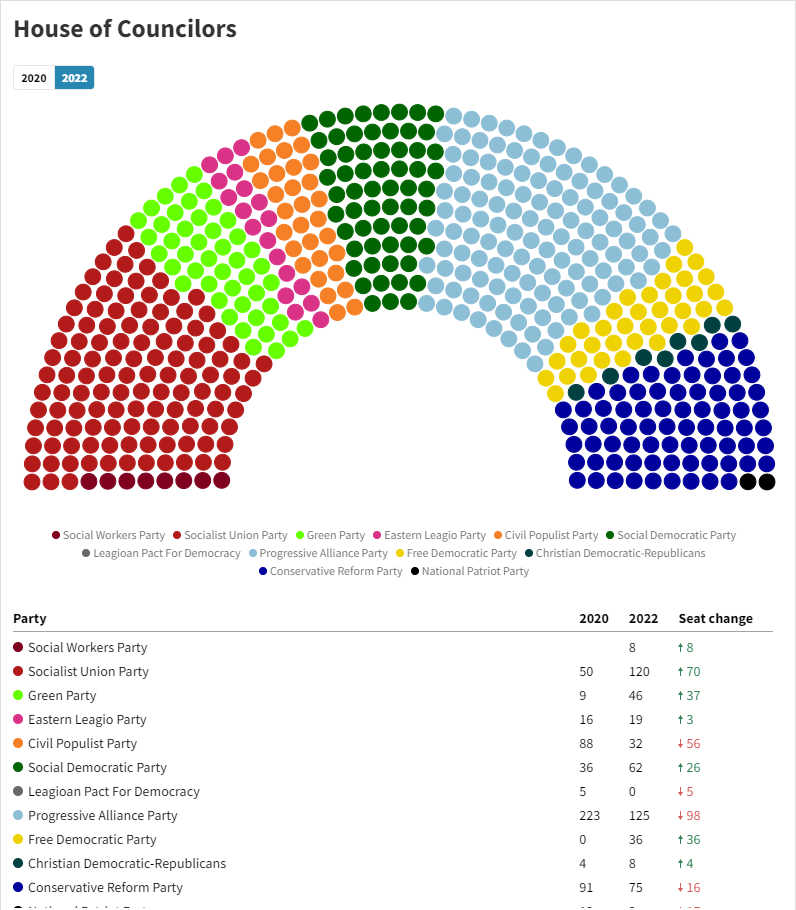
If Mouri-Kudo wants to have Lahaye continue as Prime Minister and be able to achieve some of her campaign promises instead of none, then Mouri-Kudo would have to continue the Coalition government with the UPF but now with the Social Workers Party and the PAP's alliance partner the Social Democractic Party in order to have even a functioning government, but more cabinet positions would have to been given between all member parties in the government (although, the Social Workers Party would not be able to get any as they have only 8 seats which not be enough to gaining a important seat in government).
Not long especially after the release of the results, the Social-Progressives and United Peoples Front announced that they planned to meet for negotiation of a continuing the current coalition government but with modifications that reflect the composition of those supportive to the government. In addition, the two sides announced that they would give out guidelines of a written aggreement of what the focus of the government will be until 2024. This coalition government would theotrically be more sounder than the previous as the government in the house would have 361 out of 533 seat control, which makes up about 68% of the seats meaning that the government could be able to pass key legislation without serious issues from the senate if it were to block said government. Even though, it is doubted as the Progressive and Social Democratic Senators that vote to de-ratify the expired Treaty of Tullion had lost reelection. In the senate, the government would still have a majority where altogether, they would have 77 out of 123 seats which would equal to about 63% control.
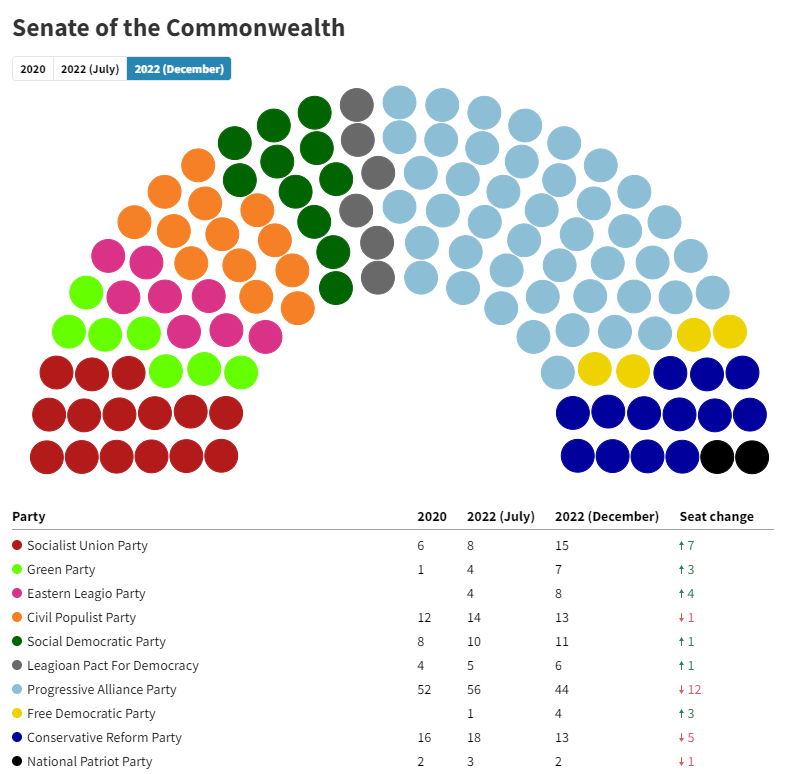
-

Social-Progressives & UPF Complete Coalition Renewal Agreement in Elmane Estate
After the results were announced in the recent election with both the Social Progressives (that includes the Progressive Alliance Party and the Social Democratic Party) and the United Peoples Front (which includes the Socialist Union Party, the Green Party, and the Social Workers Party) concluded their negotiations on renewal the current coalition government for the new session of the National Congres that will begin on January 1st, 2023, till 2025 of the same day at least. The two alliances meet in a conference held in the Elmena Estate, the Presidential Retreat in Arlick, where they discuss the various issues that they want to focus and what special agreements that they wish to implement. The two alliances agreed on Marie Lahaye continuing as Prime Minister, but the Deputy Prime Minister would instead of having the current Deputy Prime Minister Mary Scott replaced with Councilor Wilhelm Duran. In addition, the alliances agreed to divide the positions in the Council of Ministers proportional to their numbers in the House of Councilors with PAP having 5 ministers, SUP having 5, SDP having 2 and the Greens having 2. In addition, in terms of the policies of the coming second Lahaye Ministry, the following policies and measures that would be focused were agreed upon.
-
Creation of an Anti-Corruption Agency
-
Introduction of a progressive tax code system
-
Reformation of healthcare through nationalization with a multiple-payer system
-
Additional Spending Packages as well as schemes that focus on housing, infrastructure, energy (through solar and wind), and modernizing the armed forces (including the investment in drone technology)
-
Stronger (no exceptions practice) regulations on big businesses that tackle workers' rights & conditions, consumer satisfaction, and employment
-
Executive Orders regarding the UNSR will remain in place at the moment
-
Joint Agreement on two replacement candidates for the Supreme Court in 2024
-
Ensure Leagioan Membership into the Treaty of Telum by 2024
After they had agreed to the provisions that the new coalition government will focus on, the two released what the new Council of Ministers will be like for each party with a ministry. Beside each Minister is the name of the person assigned and whether or not they are a member of the National Congress with a C = Councilor and S = Senator. For names that are italicized then it means that they are new to the position.
Progressive Alliance Party
-
Minister of Foreign Affairs: Federica Mogherini
-
Minister of Economy and Treasury: Tom Kelly (C)
-
Minister of Digital Technology: Ramerra Moody (C)
-
Minister of Public Works and Transportation: Shinji Ikari
-
Minister of Research: Dr. Ritsuko Akagi
Social Democratic Party
-
Minister of Agriculture: Kathleen Wood (C)
-
Attorney General: Ethel Hearson (C)
Socialist Union Party
-
Minister of Education: Leo Goodheart (C)
-
Minister of Defence: Mary Scott (S)
-
Minister of the Environment: Harper Dawson (S)
-
Minister of Cultural Affairs: William Vazquez (C)
-
Minister of Social Services: Souma Kayuza (C)
Green Party
-
Minister of the Interior: William Develder (C)
-
Minister of Health: Mark Dime (S)
When asked about her opinion, President Ran Mouri-Kudo mentioned that as the person that appoints persons to three of the Council of Ministers positions with needed approval from the House (mainly referencing the Prime Minister, Deputy Prime Minister, and Attorney General), she felt confident in the stability of the coalition government that will be renewed officially on January 1st, 2023 where its first order of business will be the development of a new national budget by February of the same year. She mentioned that she has no doubt that this coalition will continue to be workable as it has in the past, where the Leagioan voters had shown it by going to the polls this month.
Afterward, news media interviewed the President of the United Peoples Front alliance, Freedonian Diet member James Moriarty, and asked him for his opinion on the agreements and formation of the renewed coalition as he was noticed to be present at the conference in Elmane Estate. He explained that although the alliance he leads did not get a plurality of the vote and seats, they did rise up to a higher standing in Leagioan politics when all the main left-wing parties were divided against each other and show that the alliance does work as intended in Leagioan Elections. "The only thing that we need to do differently when 2024 comes around is be prepared to campaign in a civilized by determined approach" was what Moriarty was quoted in saying to a member of the press.
Meanwhile, other political parties and alliances when they were asked about this renewed coalition government were not so ecstatic. For example, Senator Sam Russel of the Conservative Reform Party (in the Republican Future Alliance) decried the coalition as a communist wave about to stumble upon the Commonwealth by bringing in a wave of tyranny comparable to the UNSR. However, members of the Eastern Leagio Party for example think that it might provide a better opportunity for developing their represented states and might be grateful for the coalition. Others are skeptical and want to see where the renewed coalition goes like members of the Free Democratic Party.
-
-

Civil Populists in Trouble and leave Republican Future Alliance

Not long after the start of the first session of the newly elected National Congress, Chairman and Councilor (Former Governor-General) Mark Gorge stepped down as leader of the Civil Populist Party after its poor performance in the recent National Congress election in December, where said party lost 56 of the 88 seats that it gained back in 2020. The Party had performed so poorly in this election that in a election with a much larger electorate than in 2020, the Civil Populists actually lost about 600,000 which made its defeat more certain and was the cause for the scale of its embarrassing defeat. When polls were conducted as to why the Civil Populists lost so badly this election, many respondents said that it was because of the parties shift to more rightward positions and it being the cause of Mouri-Kudo being unable to govern efficiently.Inside sources said that many members of the Party feel that the future of said party is at risk of collapse and irrelevant due to its positions as well as its recent history. In addition, many members of the Civil Populists in the National Congress suspect that most of the seats and votes that they lost were of the former Left-Wing factions of the party that either went to the Social Democrats and the United Peoples Front Alliance in opposition to the party’s alliance with the Conservative Reformists and Christian Democratic-Republicans. On January 2nd, the Civil Populists temporary leadership committee with its members voted to the leave the Republican Future Alliance by 84% majority. On the same day, the leadership committee also held an election to elect a new chairman for the party itself through the method of instant runoff. Eventually, by the third round, the Party membership choose the famous Senator representing Gopen and Former Internal Affairs Commissioner Candidate Maria Kerstin to lead the party through its uncertain times.
Maria Kerstin was recently re-elected to be Senator for the party in Gopen within a safe margin as the Party did not suffer as much in the Senate side of the election by losing only 1 Senate seat. During her speech for the chairman election, Senator Kerstin said that if elected “she would rebuild the trust and relationship that the party once had with the people by going back to the party’s founding roots back in 1907 where it shifted its stances based on the needs of the people through petitions and sit-ins with the citizens of the commonwealth where it once had the name of the ‘Party of the People.’”
-

National Congress Complete New Budget for 2023
After much deliberation with the Lahaye Government and suggestions by President Mouri-Kudo, re-elected Speaker of the House Shinichi Mouri-Kudo (First Gentleman and husband to the President of the Commonwealth) announced that a budget for the Commonwealth had been agreed upon and passed through the House of Councilors through the needed means provided within the Constitution. In the budget, there was many changes that were put through focusing on areas that the Lahaye coalition government wished to be a priority of the Common Government this year at least. The industry sector of the Commonwealth received a huge cut in funding in this budget from 126 billion Sulias to now 57 billion Sulias. The reasons for this substainal cut was back by the Lahaye government and Minister of the Economy and Treasury Tom Kelly in that the industry of Commonwealth has already shown tremendous growth, but now the people need help not big business. Meanwhile, the percentages of other sectors might have been reduced but their budgets compared to last year have not by much at all.
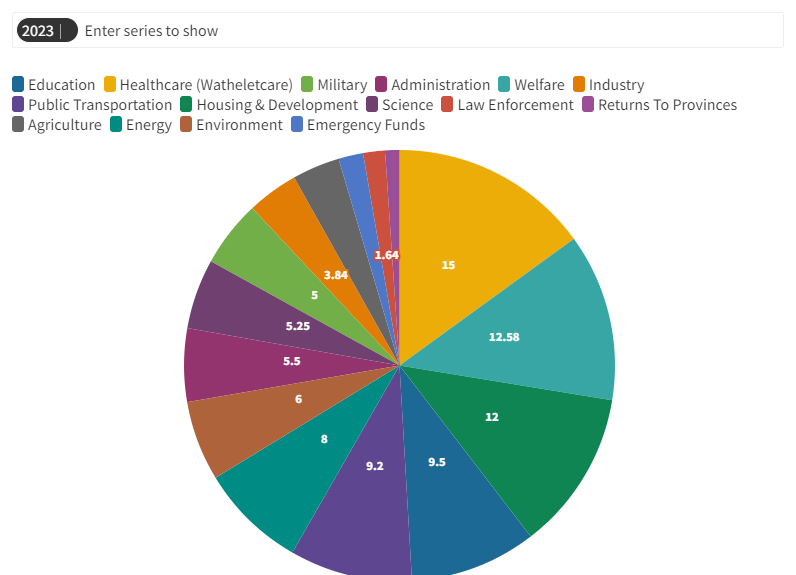
However, the areas that received an outstanding increase in budgets were Healthcare, Housing & Development, and Welfare. For example, in last years budget, the healthcare sector had a budget of just 84 billion Sulias but now it has been dramatically increased to have a budget of at least 223 billion Sulias or 337 billion Euros. Prime Minister Lahaye, during a round of question by the leading opposition party, the Conservative Reform Party, explained that the need of the large increase in healthcare was a means of not only modernizing the healthcare system of the Commonwealth but also to improve the living of Leagioans in the medical support that they received. Many experts agreed that the large increase in healthcare is Lahaye’s steppingstone to nationalizing the health system of Leagio.After debate, a vote was held on the budget with all the government majority of 361 voting in favor of the budget with 172 Councilors in the Opposition voted against the budget, while the opposition from mainly the Conservative Reformists and Christian Democratic-Republicans of 83 voting against and many of the Civil Populists voting against the budget due to disagreements on the need to provide much large spending to energy.
In addition, the budget included the following provisions that were made law for various ministries this year:
• The Ministry of Defense and Ministry of Research shall invest in research as well as develop on drone technology and hypersonic missiles.
• Ministry of Agriculture shall provide agricultural investment on additional subsidies to small farms and farms that are environmentally friendly.
• Ministry of Public Works shall provide additional funding to the rail-line from Tullion to Tokyo and classify it as a top priority project
• Ministry of Social Services shall provide monthly subsides of about 150 Sulia’s to families at or below extreme poverty for living needs
• Ministry of Social Services in coordination with the Ministry of Education shall provide a free school-lunch program to needy schools in the states in Eastern sector of the Commonwealth.
• Ministry of the Environment shall spend at least 5% of its budget for environmental rebuilding programs.
• The Ministry of Education shall provide grants to the construction to 5 schools and a university in Project Wayside
• The Ministry of Education shall spend 3% of its budget on student loan forgiveness.
• The Ministry of Cultural Affairs will introduce a job employment program and training program for minorities that are unemployed for longer than 3 years
• The Ministry of Housing and Development shall spend at least 5% of its budget for the construction of new housing projects in the states of Loors, Kyiv, and Fiowa for the year.
• The Ministry of Research and the Ministry of the Economy & Treasury shall coordinate investment on a program that shall make multi-currency use in stores simple.
• The Ministry of Public Works shall develop a blueprint plan for renovating the capitol sector for residence of the Prime Minister and the new Ministries of the Commonwealth by the end of the year. -
 _
_
Navy Purchases Ships From the United Kingdom
Last week, Prime Minister Lahaye announced that her government was able to secure a deal that was weeks in the making with the United Kingdom as part of a step to modernize the Leagioan Navy. The move comes part of the coalition agreement to modernize the military of the Commonwealth with new equipment and additional focuses on research such as Drone technology and hyper-sonic missiles. The government of Commonwealth in a agreement with the Starmer Government in the United Kingdom, the two countries would work together in developing a new class of frigates and destroyers as well as new drone. As part of a iniative to begin the process of modernizing the Leagioan Navy in particular, the Commonwealth purchased licenses for the following the British Class of Type 45 Destroyers and the Type 23 class Frigates.

(A image of LNS Gopen taken as it sailed out of Port Hilson)

(A image taken of the brand new Alberto Malillos sailing into Port Hilson)
The classes will have all the original British technology but modifications of some of the Leagioan counterparts of ASW detection and radar. The new classes will be named as according to the new ship naming conventions that President Mouri-Kudo authorized, which in this class the Type 45 Destroyers will be called the Gopen Class Destoryers and the Type 23’s are the Abel Ortiz Class Frigates. The Ministry of Defence announced that 3 of the new Gopen Class Destoryers were purchased from the shipyards of the United Kingdom (LNS Gopen, LNS Jullien, LNS Freedonia) and 5 Abel Ortiz Class Frigates were purchased as well (LNS Abel Ortiz, LNS Alberto Malillos, LNS Hyden Cole, LNS Louie Holland, and LNS Noah Valledres).
Lahaye Government Submits Bill for Nationalized Healthcare System
Prime Minister Lahaye with the support of Minister of Health - Mark Dime of the Green Party submitted a bill for a nationalized system of healthcare for the Commonwealth, where it is based on a multiple payer system of health where depending on the occupation, jobs would pay parts of it with the government of different levels of the commonwealth from Federal to local through taxes, and depending on the procedure it is paid by the patient unless it is necessary for the health and safety of the patient. The bill called the National Healthcare Act places all nurses, doctors, and medical personnel as employees of the Common government of the Commonwealth. Furthermore, the Act establishes a regulation that grants the creation of Bureau of Quality Health where it will provide price regulations. In addition, the bill would shift health insurance companies from selling insurance in general to selling benefits that would improve that would cover cosmetic surgery and other non-necessary procedures. The bill is expected to go through the Health and Social Services Committee within the House of Councilors before it goes through a official vote.
-

Federation of Centrist Democrats Aims to Empower Local Communities and Strengthen Fiscal Federalism
The Commonwealth of Leagio has witnessed the birth of a new political alliance called the Federation of Centrist Democrats. The formation of this alliance comes after the Leagioan Pact of Democracy (LPD) and the Hope for Leagio alliance joined forces to create a unified political front.
In the parliamentary election held in December, the LPD gained seats in the Senate but lost all of its seats in the House of Councilors and lost some hold in state legislatures within the Commonwealth. Many of the newly elected officials ran on a platform advocating for localism within their districts and states, indicating a shift away from non-partisan candidates.
Jordan Gauthier, the current president of the LPD, converted the party into an actual political party after realizing that the days of electing non-partisan candidates had long passed Leagio. The party congress ratified a platform that supports new federalism, giving more power to the states and local levels of government.
After adopting the new platform, the LPD began discussions with the Hope for Leagio political alliance (which includes the Free Democratic Party and the Eastern Leagio Party) to become members of the alliance. Senator Carlito Silvestre, the current president of Hope for Leagio representing Tullion, accepted the request and requested the Alliance Committee to consider a potential renaming of the alliance and a new platform that aligns with all members of the alliance.
The newly formed Federation of Centrist Democrats stands on a platform of localism, fiscal federalism, and classical liberalism. The Federation seeks to ensure that power is more evenly distributed between the central government and the provinces, while still allowing for local governments to have a say in the decisions that affect their communities. In addition, the Federation's commitment to classical liberalism means that they aim to limit government intervention in the economy while promoting individual freedoms and civil liberties.
However, there are concerns about the absence of any mention of foreign policy in the Federation's platform. Some political analysts have criticized the Federation's lack of a foreign policy stance, as they believe that it is essential for a country like Leagio to have a clear stance on international relations. They argue that in today's interconnected world, no country can afford to be inward-looking and ignore the global trends and events.
Despite these criticisms, the Federation of Centrist Democrats is expected to continue to grow in size and influence in the coming months. Many Leagioans are looking to the alliance as a new hope for a more prosperous and united future. Only time will tell whether the Federation's localist, fiscally federalist, and classical liberal platform will be successful in achieving its objectives and addressing the challenges facing the Commonwealth of Leagio.
-

Healthcare Nationalized By Congress
The National Healthcare Act, which was recently signed into law by President Mouri-Kudo, has caused a stir in the Commonwealth of Leagio. The new law aims to nationalize the healthcare service and establish a multiple-payer system. It is set to provide access to medical services to the 21% of Leagioans who currently do not have health insurance.The National Healthcare Act is the result of a bill presented by Prime Minister Lahaye and the Minister of Health, Mark Dime. The bill was widely debated in the National Congress, with arguments for and against it coming from both sides of the political spectrum.
Proponents of the bill argue that the current healthcare system is too expensive for many Leagioans and that the new system will provide affordable healthcare to all. They also highlight that the new law includes vision and dental aid, as well as mental health services.
Opponents, however, have voiced concerns about the potential cost of the new system and the impact it could have on private insurers. Some have also raised concerns about the quality of care that will be available under the new system. Leader of the Conservative Reformist Party in the House of Councilors, Councilor Kai Shina argued that the idea of nationalization the healthcare of the Commonwealth strains the budget of the government and takes away power from the states in running their own affairs. These lines are also similar to the Leader of the Federation of Democratic Centrists in the House, Councilor Furuse Mine, who argued that the bill should instead be forcing states to give away power of healthcare to the Common Government and at least offer grants to the Health Ministries in the Provinces to regulate the healthcare system to achieve more efficient results.
Despite these concerns, the bill passed through the National Congress and was signed into law by the President. In the House, the Government majority managed to pass the bill with all 361 Councilors voting in favor while the Conservate side of the House voted against with 140. The Civil Populists in Congress abstained in both houses, while the Senate quickly voted in favor of the Act by 77 Senators. The government has now begun the process of nationalizing the healthcare service in Leagio with Minister of Health – Mark Dime leading the way with the momentous task ahead that will take years to perfect and possibly by the time the task is complete a new government will be in-charge or the next election will take place.
The inclusion of vision and dental aid in the new law has been met with mixed reactions. Some have praised the move mainly those in supportive of the Lahaye Government, stating that dental and vision care are often neglected under traditional healthcare plans. Others that support nationalization healthcare such as the Civil Populist Party, however, argue that the inclusion of these services will increase the cost of the new system for something brand new being attempted within the Commonwealth.
Overall, the National Healthcare Act represents a significant change for the healthcare system in Leagio. It remains to be seen how successful the new system will be, and whether it will achieve its aim of providing affordable healthcare to all Leagioans.
-

KSP and ALUP Labeled Minority Parties
After the recent decision by the Common Electoral Commission (CEC), the African-Leagioan Unity Party (ALUP) and the Karptniz Solidarity Party (KSP) have been granted minority status for the upcoming elections in the list seat category.
This decision by the CEC means that the two parties will be exempt from the 2% voting threshold that is required for political parties to receive seats in the National Congress's House of Councilors. This is a significant victory for both parties, as they will now have a greater chance of representation in the government. The ALUP has been advocating for the rights of African-Leagioans for years, and the granting of minority status is a major milestone in their fight for representation. The KSP, on the other hand, has been working to raise awareness about the struggles of the Karptniz community and the need for greater support.
With the exemption from the voting threshold, the ALUP and KSP will be able to more effectively advocate for the issues affecting their communities, and their voices will be heard in the National Congress's House of Councilors. In addition, this recent decision by the CEC now means that the two parties will be receiving government subsidies to provide for the future success of their parties. This decision has been welcomed by many as a positive step towards a more inclusive and diverse government. The ALUP and KSP have expressed their gratitude to the CEC for their decision and have pledged to continue working towards the betterment of their communities.
In a statement, President Mouri-Kudo said, "I am pleased that the CEC has recognized the importance of ensuring representation for minority communities in our democracy. The granting of minority status to the ALUP and KSP is a step towards a more inclusive political system."
The leader of ALUP, Aisha Mbeki, expressed gratitude for the decision, saying, "This is a victory for the African-Leagioan community. We have long been underrepresented in the political sphere, and this recognition of our party as a minority interest party will ensure that our voices are heard."
Similarly, the leader of KSP, Jakob Wahalla, stated, "The Karptniz people have faced discrimination and marginalization for too long. This decision by the CEC is a positive step towards breaking down barriers and ensuring that our community has a seat at the table."
As the election of 2024 approaches, it will be interesting to see how this decision affects the outcome and whether it will inspire other minority parties to fight for their own recognition and representation.
-

Project Wayside Residents to Vote on Name for New City in Upcoming Referendum
In an unprecedented move, the State government of Arlick has announced that it will hold a referendum on the naming of the new city under Project Wayside during the upcoming EU-Commission Elections. The referendum will allow residents of Project Wayside to vote on the city's name, with options that include the names of New Belfast, Saint Beau, Valladares, Oko, or Masir.
This move has been praised by many as a positive step towards greater democracy and citizen participation in government decision-making. However, it has also been criticized by some who feel that the decision should have been made by elected officials rather than through a public referendum.
The results of the referendum will be determined through the use of the Instant-Runoff voting system, which allows voters to rank their preferences in order of preference. This ensures that the winning option is one that is preferred by the majority of voters. In addition to the naming referendum, the Arlick government has also announced that a non-binding referendum on statehood for Project Wayside will be held. This referendum is part of the coalition agreement between the Social-Progressives and Civil Populist Party coalition government in Arlick.
The Arlick government has expressed hope that the referendums will help to promote greater citizen participation in government decision-making and ensure that the needs and preferences of Project Wayside residents are heard and taken into account. The results of the referendums are expected to be closely watched by political observers both within and outside of Arlick.
-

National Congress Passes New Progressive Tax System
After debate and discussions that involved various agreements between members of Prime Minister Lahaye’s Coliation government, the National Congress was finally able to agree on the passage of a new tax system that would be more progressive and provide more equality of income between Leagioans. The bill that passed the National Congress, on March 27th, called the Progressive Tax Share Act introduced a tax bracket system that Leagioans would pay the Common government outside of the State or Territorial Income Tax that they would have to pay with their year income. The agreed upon brackets was something that had been in constant negotiation between members of the Lahaye Coalition Government and the Finance Committees in both Houses of the National Congress. The Act also included a list of new taxes that would be introduced that repealed or merged other tax acts that were passed since the founding of the Commonwealth. For example, the Progressive Tax Share Act was merged with the Negative Income Tax Act of 1982, where it provides to a people to spend freely as a stimulus if they are below the lowest tax bracket. In the case of the new tax act, the lowest bracket is where single people have to pay 0% of taxes if they make 10,000 Euros or 6,535 Sulias a year.
Tax Income Percentage bracket Income for Single Filing in Euros (Sulias) 0% <10,000 (6,535) 18.5% 10,001 - 29,451 (6,536 - 19,249) 24% 29,452 - 50,369 (19,250 - 32,921) 30% 50,370 - 82,781 (32,922 - 54,105) 33% 82,782 - 98,834 (54,106 - 64,597) 40% 98,835 - 131,625 (64,598 - 86,029) 46.5% 131,626 - 168,325 (86,030 - 110,016) 49% 170,526 - 250,025 (110,017 - 163,415) +2% over 250,026 (163,451) +5% over 500,000 (326, 797) Most of the taxes that were repealed were of the more of the Pro-Big Bussiness taxes during the Presidency of Alberto Malillos (1994-2000). In these taxes passed by Lahaye, the Captial Gains Tax, Corporate Tax, Excessive Profits Tax was raised by over 10 to 15% or in the case of the Excessive Profits Tax then a up to 38% increase. However, the Progressive Tax Share Act also included new taxes that were considered controversial by the opposition parties which were a Expatriation Tax for persons that wish to emigrate outside of the Commonwealth that to is also progressive with its highest rate being at 42.6% for person with a income of over 150 million Euros or 229.5 Million Sulias. Members in the Conservative Reform Party and in the more old-guard as well as conservative members of the Progressive Alliance Party (the party of President Mouri-Kudo and Prime Minister Lahaye) opposed calling it a move of attacking the free market of business within the Commonwealth. Some of the taxes that were implemented into the Act can even be raised to certain level by state governments when passing their own taxation legislation. Another complaint that was raised by the opposition, mainly those in the Conservative Reform Party, was the idea that the tax rates where too high of a burden on the population of the Commonwealth. For example, Councilor Tristan Fortier (also a member for the party in the House Finance Committee from where the bill started) argued that the flat tax rate that was started by President Mallilos provided more food to the table for poor working-class families of the Commonwealth. However, President of the United Peoples Front Alliance James Moriarty sent a retort on television yesterday during a conference with the Commonwealth Steel Workers Union by saying that "Councilor Fortier seems to have forgotten that the flat tax rate started by Malillos had hurt the eastern states or territories at the time as the Flat Tax Act prevented States and Territories from passing laws that allowed them introducing their form of a progressive system to pay for their governments, which had hurt the families of union workers and common citizens in the east as the flat tax did not account for lower-income situations." Moriarty had also made an additional retort in that the flat tax had actually made big businesses in the commonwealth stronger and have more power to the point that it require Mouri-Kudo to pass the Labor Union Civil Rights Act a couple of years ago.
Tax Type Rate Sales 2% (can go up to 6% by Provinces) Corporate 38.5% Payroll 3.4% (can go up to 5.1% by Provinces) Capital Gains 29.4% Expatriation 42.6% Excessive Profits 40% Alcohol 8.2% (can go up to 12% by Provinces) Vat 2% (can go up to 6% by Provinces) The Progressive Tax Share Act passed the National Congress where in the House of Councilors had 295 Councilors Approving the bill and 238 against the bill with some being from Mouri-Kudo’s own party; The Senate approved the bill with 73 Senators For and 50 Against it (with a couple too being from Mouri-Kudo’s Party). The Fact that some of Congressmen in the PAP have brought recent concerns that the Progressive Alliance Party is at risk of fragmenting and shattering the majority that the Lahaye government currently has. However, President Mouri-Kudo expressed reassurance that there is no sign of serious conflict with members within her own party. "Although, it is understandable that some might feel that there is fragmentations happening with the Party, " The President said in a conference with the press after signing the act yesterday, "but it is common for disagreement within the interiors of larger parties to occur. The party took their opinions but was unable to meet the needs of every member in both houses and so we have the results that we saw on the 27th of March. However, the members that voted against the party made reassurances that they had no intention to split with the party that they have benefitted from at this point. We will try to accommodate for them better in the future as a sign of understanding."
-


(MInister Tom Kelly at the annual Commonwealth Economic Forum last weekKudonomics: Bold Government Intervention or Recipe for Disaster? Congress Divided on Economic Policies
In a interview recently at the annual Commonwealth Economic Forum in Dilaton, Condris, Minister of the Economy and Treasury Tom Kelly explained that the economic policies that he termed as ‘Kudonomics’ have been driving the economy of the Commonwealth of Leagio to new heights. The 45 year-old minister and Councilor representing the southern eastern section of Gopen since 2003 backed his statement by illustrating how the GDP of the commonwealth has risen by 250% of what it was before the inauguration of President Ran Mouri-Kudo after two year period, where the Country has a strong economy that can efficiently compete against other European nations economically. When compared to the previous president of Kenith Lifejumper, the GDP has see more growth with yearly salaries rising by at least 30,000 Sulias. Furthermore, Minister Kelly stated that in his opinion the policies of Mouri-Kudo involving the implementation of a progressive tax system, focused attacks on reducing the power of big business, increased government spending as a way to increase GDP with development for eastern provinces, and the creation of a ethics code for business to follow was very effective and successful.
The term of Kudonomics has been on the rise in the commonwealth through social media lately that has helped to improve the image of the current president where it involves a level of government intervention in the economy that had not been seen since the days of President Maxime Gauthier, who implemented his New Deal program during the economic hard times of the 1950s. The level of intervention when compared to President Lifejumper in particular is more aggressive in where Mouri-Kudo and Lahaye implement large-scale government spending in infustrature that went above even Lifejumper’s Eastern Economic Development Act which had the spending of 4 billion sulias that were saved to improve the infrastructure of the eastern provinces during a time of economic uncertainty after the Commonwealth joined the European Union.
However, many members of the National Congress that are in opposition to the Lahaye Government argued by explaining that the increase spending had caused a large decrease in the savings and amount of disposable income that the common Leagioan has in their pockets while at the same time the cost of living within the Commonwealth has risen by a large amount as well, which will at some point in the future will come back and do even more damage to the economy that will reverse all the results and effort of the Lahaye government.
In response to especially from the criticism of Councilor James Hilda from Huttson and of the Conservative Reformistists (who made such comments in the floor of the House of Councilors during its weekly 2 hour period of debating the policies of the government and the President), Economics Professor of the University of the Commonwealth William Heasa explained that “although, increased cost of living may result in lowered disposable income for some Leagioans, which could have negative effects on consumer spending and economic growth in the long term. The benefits in the long-term will start to outweigh them in the future at an even further state.” Another comment of concern from members of Congress was that Senator Maria Kerstin, herself, who issued a statement of concern that these large scale and expensive development programs will lead to a level of Debt that the Government will probably need to burrow from the EU and other European powers in order to finance the programs and projects completion.
Professor Heasa continued to explain that the effects of Kudonomics in how the benefits will still out weight the costs in that:
• By focusing on development for eastern provinces, Kudonomics may help to improve infrastructure in those regions, which could have long-term benefits for the economy.
• The progressive tax system implemented under Kudonomics may help to reduce income inequality in the long term, which could have positive effects on social and economic stability.
• By implementing a progressive tax system and reducing the power of big business, Kudonomics may help to create a more stable economic environment in the long term. -

Ministry of Environment Launches Innovative Recycle Payment Scheme to Promote Sustainability
In a groundbreaking move towards fostering environmental sustainability, the Ministry of Environment has introduced a pioneering Recycle Payment Scheme aimed at incentivizing and rewarding individuals and communities for their recycling efforts. This initiative, a first of its kind in the Commonwealth, is set to revolutionize waste management practices and create a culture of responsible consumption.
Under the Recycle Payment Scheme, individuals and households will be encouraged to participate actively in recycling programs by providing monetary incentives for their recycling contributions. The scheme aims to motivate citizens to separate and recycle their waste effectively, reducing the burden on landfills and promoting the circular economy.
Through this scheme, citizens will receive a designated monetary value for each unit of recyclable material they properly dispose of, such as paper, plastic, glass, and metal. The Ministry of Environment will collaborate with local municipalities and recycling centers to implement an efficient tracking and reimbursement system. Participants will be able to claim their rewards through various methods, including mobile applications or designated collection points.
The Recycle Payment Scheme not only serves as a financial incentive for individuals but also fosters a sense of responsibility and environmental consciousness. By actively participating in recycling initiatives, citizens will contribute directly to the preservation of our natural resources, reduce greenhouse gas emissions, and combat the detrimental effects of waste accumulation on our ecosystems.
This initiative aligns with the Ministry of Environment's broader goals of achieving sustainable development and reducing the carbon footprint of our nation. The Recycle Payment Scheme aims to significantly increase recycling rates, thereby reducing the need for raw materials extraction and reducing the environmental impact associated with waste management.
The introduction of the Recycle Payment Scheme reflects a proactive and forward-thinking approach by the Ministry of Environment. By encouraging citizens to play an active role in waste reduction and recycling, the scheme aims to create a paradigm shift towards a more sustainable and environmentally conscious society.
The Ministry of Environment invites citizens, local municipalities, and businesses to actively participate in this transformative initiative. Together, we can shape a greener future, where recycling becomes an integral part of our daily lives, benefiting both our environment and future generations.
By introducing the Recycle Payment Scheme, the Ministry of Environment sets a precedent for innovative environmental policies that prioritize sustainability and create a positive impact on our society. It is a significant step towards a more circular and responsible approach to waste management in our nation.
-

Treaty of Telum Membership Bill enters National Congress with heated debate
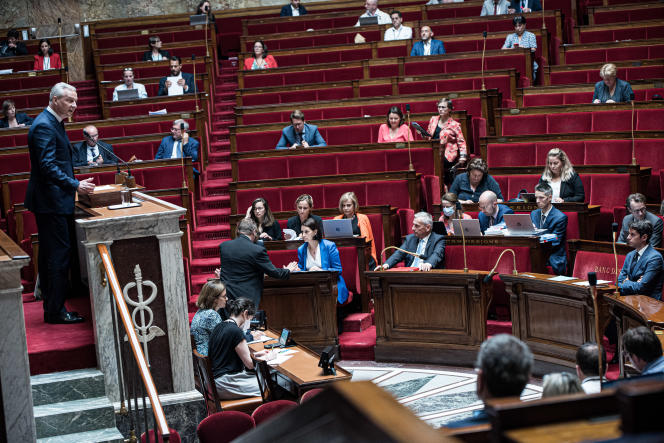
This afternoon with much coalition between the different parties of Prime Minister Lahaye’s government, Minister of Foreign Affairs Federica Mogherini submitted a bill to the Foreign Affairs Committee in the House of Councilors with a additional copy being submitted to the Sentate. In this bill was a bill of ratification of the Treaty of Telum should its member nations welcome Leagio into the Alliance. However, the road for ratification will be hard for at least Mouri-Kudo and Lahaye in their party to get in line with the Treaty. Almost every member of the United People’s Front Alliance within both houses of the National Congress have stated that they would vote in favor of a Leagioan Ratification of the Treaty of Telum as well as all the members of the Social Democratic Party. However, the same cannot be said of the members within Prime Minister Lahaye and President Mouri-Kudo’s party (Progressive Alliance Party), where the more conservative flank of the Party have strong hesitations and in multiple occasions have threaten to vote against the Treaty’s ratification. 12 Senators for the Progressive Alliance Party have stated that they are against the idea of a ratification. The main reason that they have issued that they favored the policy of de-facto neutrality within the European Union, which has been a policy started in the last months of the Lifejumper Presidency. However, many members of the United People’s Front Alliance that policy had since failed once President Lifejumper managed to get the ratification of now expired Treaty of Tullion with the Kingdom of Ritzmag.
Even Governor-General Kaito has raised hesitation to allow the bill of ratification to pass the Senate as he has the power of President of the Senate. However, the issue is that if Prime Minister Lahaye can get enough support within the House of Councilors, then she might be able to get the Bill passed through the House if the Senate does not respond have the House pass the bill again with the two-thirds majority vote but she would need support of all the members of the Progressive Alliance Party in the House of Councilors to pass it. Rumors have been running from sources within the Executive Mansion that President Mouri-Kudo is currently meeting with the dissenting members of the Progressive Alliance Party to come to a compromise in resolving the issue smoothly.
Other rumors are running that members of the Foreign Affairs Committee within both House and Senate are currently wanting to issue a request of testimony on Spanish President Jesus Aguilar to represent the Treaty of Telum Alliance. A request of testimony by a Congressional Committee does not hold criminal investigation on what a committee is studying or investigating, merely it is a request by the Committee or Committee’s to provide information on a topic relating to a bill being debated within the National Congress committee if possible. The resolution is merely a request by the committee to provide information to help the committee to obtain viewpoints on an issue of debate from experts or witnesses. Pundits believe that the reasoning for the resolution of testimony is one of the holdouts of the many members of the National Congress is that they have highlighted the time of Elizabeth Truss comment of EU law being used as Toilet Paper. This comment made by the former Spanish Minister in Aguilar’s Cabinet was being in relation to heightened tensions that were involved in the debate within the EU Council over the Navigation of Seas Act that occurred last year, which many opponents to the Treaty of Telum used in connection whenever the discussion of Leagioan membership into the treaty is ever brought up into the floor. However, supporters of Leagioan membership stated that the Spanish President rectified the issue by removing Truss from her position had apologized for the statement made by the Former Minister. But same people that mentioned the rumors state that the resolution of testimony is unlikely to come through due to the recent news that President Aguilar will be stepping down from his position.
The initial debates within the Foreign Affairs Committees of the two houses in the National Congress are expected to last for at least till next week, where they will decide on whether or not to allow it to proceed for the debate in the main floor of either of their chambers.
-

Treaty of Tellum Ratification Resolution Passes National Congress after Intense Negotiations and Passing Stronger Electoral Reform for 2024
In a historic session held yesterday, both houses of the National Congress came together to pass two pivotal pieces of legislation, marking a significant milestone in the nation's political history. The Treaty of Telum Ratification Resolution and the Democracy & Stability Act were met with bipartisan support, signaling a renewed commitment to international cooperation and a more inclusive democratic process.
The Treaty of Telum, a landmark international agreement aimed at fostering peace, security, and cooperation among participating nations, has been under careful consideration by the National Congress for the past several months. After thorough deliberations and discussions, legislators reached a consensus, recognizing the mutual benefits of ratification. This monumental decision solidifies the nation's commitment to global stability and collaboration on key international issues, where the Commonwealth would be placing in a different political playing field where it would have a member of ECON in the north (Yosia) but Minister of Foreign Affairs Federica Mogherini reassured members of the National Congress in both houses Foreign Affairs Committee in saying that the relations between Leagio and Yosia will not having any sudden deterioration in how the countries committed to trade and the Southern Europe Universal Rail that connects the two with Ethize and the Duxburian Union to transport freight and passengers. The treaty puts Leagio in a defensive alliance with Spain, Inquista, Duxburian Union, and North Diessen. The Treaty also provides benefits that involves Artabanos Canal, Suez Canal, and the Strait of Gibraltar which are waterways that Commonwealth trade depends upon for a majority of its overseas shipping.
Simultaneously, the passage of the Democracy and Stability Act marks a significant step towards modernizing the nation's electoral system. Inspired by successful models from around the world, the bill introduces a Proportional Representation (PR) District method for the House of Councilors, aligning with contemporary democratic practices where the size of the House of Councilors will be keep to a base number of 525. This reform addresses long-standing concerns regarding the fairness and accuracy of representation in the House of Councilors, creating a more inclusive political landscape. By adopting the PR District method, the National Congress aims to better reflect the diverse perspectives and interests of the nation's citizens, ultimately strengthening the democratic foundation of the country and allowing more connectivity with the people that the Councilors represent. The number will also take effect for representation to be provided to the Project Wayside community that will be renamed to Oko City and be represented in the National Congress as a state of the Commonwealth separated from the State of Arlick. The action comes as the referendum that took place named Project Wayside as Oko City with a majority wanting statehood, which the Arlick state government decide to make approval of and got the approval of the National Congress. Oko City will officially run as a state with its own elected government after the 2024 National Election. In the results census completed last year, the new coming State of Oko City will have 6 seats in the House of Councilors which will increase the total new starting number of the House of Councilors to 531 for the 2024 Election.
The Democracy and Stability Act also included many different provisions of the method of Proportional Representation and elections for positions in the European Union. One of the important regulations created were on political alliances, where the act established that parties in alliances can decide if they want to distribute seat separately from alliances during the calculations. The national vote threshold was kept at 2% for individual parties and 6% for alliances, which will be calculated with the D'Hondt Method. However, if a party that has 2% of the national vote does not receive a seat and is not in a alliance, then they will be qualified to receive subsides at the amount that is given to minority interest political parties until the next election unless they run into the same situation. In addition, the Leagio voter will be allowed to cast four different types of votes with minor differences. The First two relate to their first choice of party and person and then a second preference with the same types. The purpose of the second preference is if mainly the party that someone votes does not make the 2% threshold, which at that point will be redistributed to the voter’s second preference of both party and person. In addition, the act authorize funding grants to political parties and alliances that help elect independent affiliated candidates into the National Congress.
One of the key factors that led to the successful passage of the Electoral Reform Bill was a strategic political maneuver. Conservative members of Mouri-Kudo's party, recognizing the importance of the Treaty of Telum Ratification Resolution, entered into negotiations that resulted in a historic deal. As part of the agreement, they supported the electoral reform, paving the way for a more balanced representation in the House of Councilors. The successful passage of both the Treaty of Telum Ratification Resolution and the Electoral Reform Bill put into question the path of the Commonwealth and the stability of the Progressive Alliance Party as Mouri-Kudo had to make direct concessions to the conservative faction of her own party to achieve what she made as a campaign promise that she needed to fulfill before the Primary elections for both the office of President and Governor-General (which Mouri-Kudo’s party hopes to gain as it is a consider a vote in the Senate).
For matters relating to EU elections, the Democracy and Stability Act changes to where the the Foreign Affairs Commission is elected by the National Congress by Instant Run-off, the Premier Commissioner is elected by first-past-the-post in the order of placement, and the Internal Affairs Commissioner is elected in the order of placement as the Premier Commissioner.
Polls show that a majority of Leagioans approve of the Democracy and Stability Act and the passage of the Treaty of Tellum Ratification Resolution that was passed, but many criticize the hoops that had to be made by Mouri-Kudo in a political fight that should have to last for two whole months entirely since the presentation of the ratification bill back in the summer.
-

Mouri-Kudo Announces Second Term Bid, Faces Primary Challenge within Social-Progressives; Lahaye will not Run for Prime Minister for 2024
President Ran Mouri-Kudo electrified the political landscape today by officially declaring her candidacy for a second term. In a televised address from the presidential palace, she highlighted her administration's achievements on foreign policy, social justice, and environmental protection, while acknowledging the challenges that remain.

(President Mouri-Kudo making her televised address to the Commonwealth on her plan to run for a second term)"During my first term," President Mouri-Kudo stated, "we've secured historic trade deals, strengthened alliances, and championed human rights on the global stage. At home, we've expanded access to affordable healthcare, enacted landmark environmental legislation, and made significant strides towards gender equality."
President Mouri-Kudo's announcement comes amidst a flurry of primary elections across the Commonwealth of Leagio. Within her own Social-Progressive alliance, she faces a primary challenge from renowned environmental activist Racheal Brownson, who has garnered support for her call for more radical climate action. The Social-Progressive primary promises to be a lively contest, highlighting the internal debate within the alliance. President Mouri-Kudo represents a pragmatic approach, focusing on incremental progress within the existing political framework. At the same time that she announced her candidacy for the Social-Progressive Presidential Primary, Prime Minister Marie Lahaye announced that she will not seek another term for Prime Minister for 2024 and would run only as a Senator for the Progressive Alliance. In response, President Mouri-Kudo announced that she endorsed the idea of having Revy Robertsen as her candidate for Prime Minister. Revy Robertsen is currently a Councilor representing the List Sector of the State of Jullien who has a reputation of being hard on members of her own party that backtrack on agreements. In fact, it was through the shrewd and tough tactics of Revy Robertsen on pressing on members of her own Alliance to vote in favor of the Treaty of Tellum Ratification Resolution through the House. Although, she also managed to use a good amount of negotiation for the reform on electing members of the House of Councilors through a PR-District method.

(Revy Robertsen before entering the chamber for the House of Councilors)While the Social-Progressive primary captures much of the current attention, other parties and candidates are vying for the spotlight. Meanwhile, in the other parties and alliances, there are still debates and questions on the top candidates at the moment. James Moriarty, the President of the United Peoples Front, has confirmed that he will not run as the Alliance’s candidate for President nor Governor-General at the moment, which leaves the question that he might run for a National Congress seat to be Prime Minister if his alliance wins. As the primaries unfold, voters across Leagio are grappling with critical issues. The economy, healthcare, education, and the environment remain key concerns, with each party offering distinct positions. The upcoming months will be filled with passionate debates, rallies, and strategic maneuvers, as candidates strive to earn the trust and support of the electorate.
Meanwhile, the Republican Future Alliance are currently unable to back a main candidate for their alliance as it is divided between candidates that either want to align with the Alternative for Leagio party (formed out of merger with the Christian Democratic-Republicans and the National Patriot Party or work with the Federation of Democratic Centrists).
Meanwhile, the Federation of Democratic Centrists are stuck between two main candidates for President: Carlito Silvestre (a Senator for the FCD representing Tullion) and Jackson Ellis (a Councilor representing the FCD for the List Sector of Kiev). Senator Silvestre is running a strong deregulation policy on business, while Councilor Ellis has been running his primary campaign on a balanced approach on deregulation and government spending to support local governments.
President Mouri-Kudo's decision to seek re-election throws open a series of questions. Can she overcome the primary challenge within her own party? How will she address the concerns of young voters and those frustrated with the pace of change? What strategies will her opponents employ to capture the public's imagination? One thing is certain: the upcoming elections in Leagio promise to be exciting and consequential, shaping the nation's trajectory for years to come. All eyes are on the primaries, where the seeds of tomorrow's leadership are being sown. -

Lifejumper Is Going to Have a Hard Time for HOC Majority for FDC - OPINION by Henry Fuller

(Photo taken of Former President Lifejumper after giving his acceptance speech at the FCD Party Congress)In a surprising turn of events, former President Kenith Lifejumper has announced his candidacy for Prime Minister under the banner of the Federation of Centrist Democrats (FCD) for the upcoming December election. Lifejumper's campaign is built on a platform of deregulation, localism, and fiscal federalism, positioning himself as a moderate alternative to the current political landscape.
Lifejumper's campaign emphasizes a return to centrist policies, focusing on streamlining government operations and empowering local communities. "Our nation needs a balanced approach that combines fiscal responsibility with social progress," Lifejumper stated at his campaign launch. "We aim to reduce bureaucratic red tape, give more power to local governments, and implement a fair system of fiscal federalism."
However, Lifejumper faces an uphill battle in attracting voters from the incumbent government containing Mouri-Kudo's Social-Progressives party. Many voters have grown accustomed to and supportive of Mouri-Kudo's extensive social welfare programs and government spending initiatives. This presents a significant challenge for Lifejumper's more fiscally conservative platform.
Political analyst Dr. Amelia Thornton of Abel Ortiz College notes, "Lifejumper's policies may resonate with centrist voters, but he'll struggle to win over those who have benefited from Mouri-Kudo's expansive social programs. His success may depend on convincing voters that his approach can maintain social benefits while improving economic efficiency."
Interestingly, Lifejumper's campaign appears to be making unexpected inroads with traditional Conservative Reform Party (CRP) voters. The CRP's recent shift towards far-right policies and its unofficial alliance with the far-right right party, Alternative for Leagio, has alienated many of its moderate supporters, creating an opportunity for Lifejumper's centrist message.
"We're seeing a significant number of disillusioned CRP voters looking for a new political home," explains pollster Marcus Chen from the Jullien State University. "Lifejumper's moderate stance on social issues combined with his fiscal conservatism is appealing to this demographic." Another topic that Marcus Chen focused on was Lifejumper’s stance on maintaining a balance between ECON and Telum on foreign policy, where Lifejumper’s foreign policy as President was known as a humanitarian neutralist in avoid serious conflict when needed. Although, his foreign policy in the FCD does not include deratifying the Treaty of Telum for the Commonwealth, it does include using the treaty to act as somehow a neutral and voice of reasoning between the members in the Telum alliance. This policy might resonate with some voters in Mouri-Kudo’s alliance if foreign policy was a serious focus on their minds, but the issue is that voters believe that economic prosperity is a more important issue that matters on their decision to vote. A situation that some high level members of the FCD Party Congress is aware of and is desperate to tackle with a solution very quickly. At the moment, the only huge development plan that the FCD developed that attracts non-conservative voters are the plans to help Eastern States prosper.
As the election approaches, all eyes will be on Lifejumper to see if he can build a coalition broad enough to challenge the incumbent government. His success may hinge on his ability to balance fiscal conservatism with promises of maintaining popular social programs, all while capitalizing on the CRP's rightward shift. However, another problem that the Former President will have is that he might not even get a majority in the House and will for sure not get one in the Senate. Suppose he wants to have a strong position number of seats in the House of Councilors. In that case, he will have to steal enough from the Social-Progressives to where said Alliance is forced to make a coalition with him as a majority of the members of Mouri-Kudo’s alliance prefer the current coalition with the socialist United People’s Front led by James Moriarty as it has proven to be more stable as well as workable when the Progressive Alliance Party and Mouri-Kudo had a coalition with Lifejumper’s former party, the Civil Populists.
The December election is shaping up to be a test of the electorate's appetite for centrist policies in an increasingly polarized political landscape. As campaigning intensifies, Lifejumper's ability to navigate these complex political waters will be crucial in determining the Federation of Centrist Democrats' chances of success.
-

Wilson's Minister-Governor Napoléon Michaux’s Cabinet Collapsed after CRP Admits AfL into Republican Future Alliance
During a session of the Wilson Legislative Assembly, the Civil Populist Party informed the Speaker of the Assembly that they had withdrawn their support for Minister-Governor Napoléon Michaux Cabinet after an argument as well as disagreement on restricting abortion to no more than 10 weeks. In addition, another reason that the Civil Populists withdrew their support was due to the rightward shift of the Conservative Reformist Party where it admitted the far-right Alternative for Leagio party into the Republican Future Alliance. For Michaux and his cabinet, the withdrawal of Civil Populist support is a very concerning issue as the Wilson Legislative Assembly has a total of 35 seats. His cabinet barely had a majority with the support of the Civil Populists. Out of the 35 seats, his cabinet had 18, just one short of a majority, and the Civil Populists had two seats in the Assembly. His Cabinet had a coalition of Micheaux’s party (CRP) with 14 seats, the Christian Democratic-Republicans with 2 seats, and the Civil Populists with their 2 seats. The problem gets worse as the Christian Democratic-Republicans were losing elected members to the newly formed Christian Farmers Union or CFU (a new centrist agrarian party that is looking to gain traction by taking advantage of the collapse of the Commonwealth conservative voters support to the Conservative Reform Party) and rumors in the Wilson Legislative Assembly have been saying that its two members in the state capital of Freetown are considering switching to the CFU.
Due to the lack of a majority, the Civil Populist Party with the support of the Opposition in the Legislative Assembly announced a Motion of No Confidence on Minister-Governor Michaux that passed and was submitted to Governor of Wilson - Victor Reese where it was approved. Afterwards the opposition parties agreed to a 4 way party coalition of the Progressive’s, Social Democrats, Civil Populist’s, and the Socialist Union with Brant Dean of the Progressive’s acting as the new Minister-Governor with a cabinet composing of the four parties.